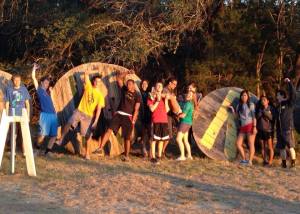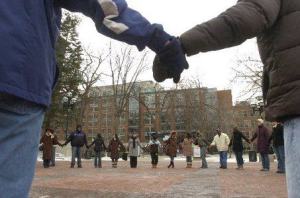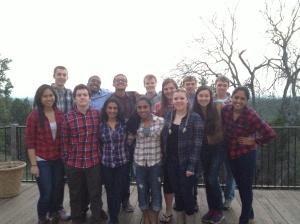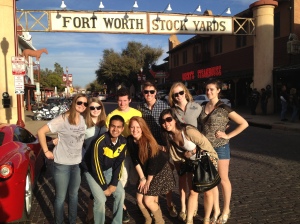Every week, members and partners of the Alternative Spring Break (ASB) community will share their Alternative Stories, a series of narratives inspired by the experiences, memories, and meanings made and shared through ASB. International Studies and Biology student and site leader Mackenzie McIntyre shares her story this week.
 Haphazardly stuffed with sleeping bags, rain coats, and (soon to be forgotten) economics textbooks, our white Dodge hybrid waits patiently on the corner of Church and Hill Street, preparing for the 18-hour adventure that would eventually deliver 11 college students to Waco, Texas. During a week when students tend to favor home-cooked meals, 24-hour Netflix binges, and the balmy breezes of Punta Cana, we will be working on a sustainable farm, engaging in a poverty simulation, and learning about the intersecting issues surrounding domestic hunger.
Haphazardly stuffed with sleeping bags, rain coats, and (soon to be forgotten) economics textbooks, our white Dodge hybrid waits patiently on the corner of Church and Hill Street, preparing for the 18-hour adventure that would eventually deliver 11 college students to Waco, Texas. During a week when students tend to favor home-cooked meals, 24-hour Netflix binges, and the balmy breezes of Punta Cana, we will be working on a sustainable farm, engaging in a poverty simulation, and learning about the intersecting issues surrounding domestic hunger.
What could ever convince a group of college students to trade the sun, the sand, and the warmth of Mexico for seven days of service-learning on a sustainable farm in Texas? Well, I can’t speak for the other ten people in my van, but I can certainly attempt to describe the incredible sequence of events that eventually led to this moment.
My experience with Alternative Spring Break developed during a period of my life in which uncertainty characterized every moment. Uncertain friends. Uncertain groups. Uncertain major. Uncertain future. As the thrill of freshman year dissipated, I was left without any sense of true belonging. I was a confused sophomore — too old to claim naivety, yet too inexperienced to feel secure.
I was searching for a family, but I felt too lonely. I was yearning for a purpose, but I couldn’t seem to pin one down. I was craving a challenge, but was left unmotivated.
Everything felt so uncertain.









 tivation and patience toward finding them: There are the educational movies and other resources we’ll be sharing with the rest of East Quad at our upcoming pre-break engagement event, as well as professors — even those whose classes we’d had — who dedicate their time and research to the topic of rural poverty. Even our own participants made the connections between academic studies such as medicine, business and education and how they pertain to the roots and causes of rural poverty.
tivation and patience toward finding them: There are the educational movies and other resources we’ll be sharing with the rest of East Quad at our upcoming pre-break engagement event, as well as professors — even those whose classes we’d had — who dedicate their time and research to the topic of rural poverty. Even our own participants made the connections between academic studies such as medicine, business and education and how they pertain to the roots and causes of rural poverty.




